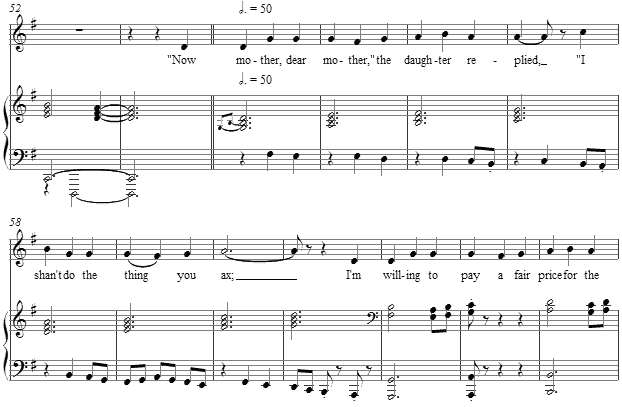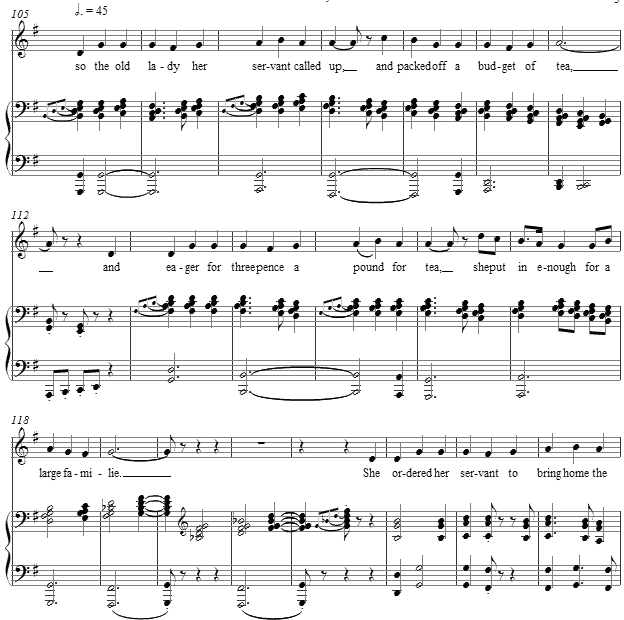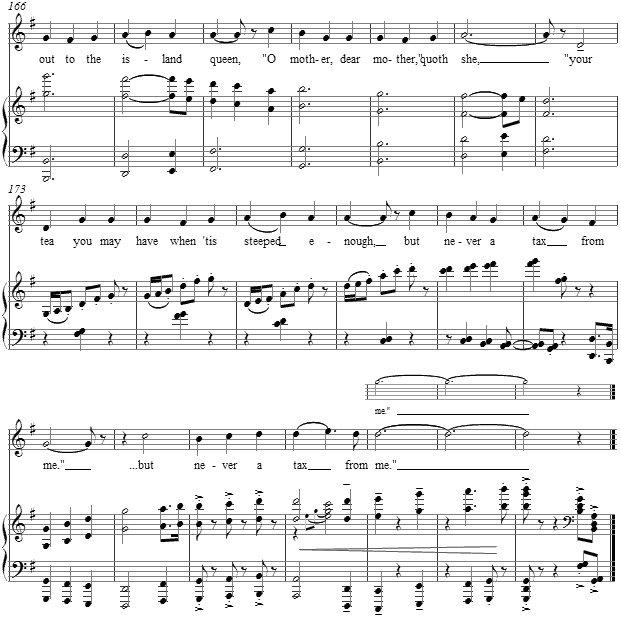Music and Texts of GARY BACHLUND
Vocal Music | Piano | Organ | Chamber Music | Orchestral | Articles and Commentary | Poems and Stories | Miscellany | FAQs
Revolutionary Tea - (2009)
an arrangement of a traditional text and melody
for medium or high voice and piano
There was an old lady lived over the sea,
And she was an island queen;
Her daughter lived off in a new countrie,
With an ocean of water between.
The old lady's pockets were filled with gold,
But never contented was she,
So she called on her daughter to pay her a tax,
Of three pence a pound on the tea,
Of three pence a pound on the tea.
"Now mother, dear mother," the daughter replied,
"I shan't do the thing you ax;
I'm willing to pay a fair price for the tea,
But never the three penny tax."
"You shall," quoth the mother, and reddened with rage,
"For you're my own daughter, you see,
And sure 'tis quite proper the daughter should pay,
Her mother a tax on the tea,
Her mother a tax on the tea.
And so the old lady her servant called up,
And packed off a budget of tea,
And eager for three pence a pound, she put in
Enough for a large familie.
She ordered her servant to bring home the tax
Declaring her child should obey,
Or old as she was and a woman most grown,
She'd half whip her life away,
She'd half whip her life away.
The tea was conveyed to the daughter's door
And all down by the ocean side,
And the bouncing girl poured out every pound
In the dark and the boiling tide,
And then she called out to the island queen,
"O mother, dear mother," quoth she,
"Your tea you may have when 'tis steeped enough,
But never a tax from me,
But never a tax from me."[ 7 pages, circa 3' 50" ]
A representation of the historic Boston Tea Party
While rummaging through the South Carolina room of the Main Library in Charleston, I came across a title, Songs That Changed the World. Among the first citations was this traditional text and melody, Revolutionary Tea. Given that in the modern political dialogue not only in the United States but throughout much of Europe is about taxes becoming to high a burden for the working classes, this sentiment from1776 about "no taxation without representation" captured the beginning of that revolt against a burdensome government which resulted in the Revolutionary War. Several more traditional settings of this text and melody are to be found, but I thought it provoking to again consider this historical stance and event with a new arrangement.
The first strophe begins with awkward, angular arpeggios, a "pedal" of G and F#. This secco introduction underlies without harmonizing the melody line.
The next strophe begins a more dense harmonization as the tempo slows to become more earnest, more serious as the players, both feminine in the metaphor as the drama unfolds.
Further slowing for the next strophe underscores the melody line with that quote from both the British and American hymn, "God save our gracious king" which became through revolution the new nation's "God Bless America."
The last strophe becomes yet more stern, as the assertion, "never a tax from me" is repeated, rising to the highest pitches in the range of the setting. The ossia is available as desired, though the original last note was conceived as D.
The score for Revolutionary Tea is available as a free PDF download, though any major commercial performance or recording of the work is prohibited without prior arrangement with the composer. Click on the graphic below for this piano-vocal score.




